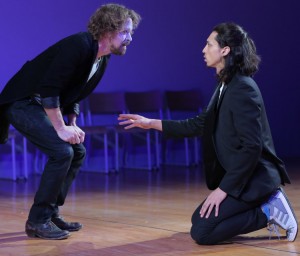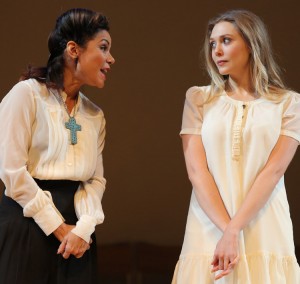Updating Shakespeare is like putting a diaper on a porcupine. It's not strictly necessary, but if you are going to do it, you had better be very careful. Director Tea Alagic’s production for the Classic Stage Company is so illogical and reckless that, if the metaphor were literal, she’d look like a pincushion.
For starters, Alagic, whose credits don't include Shakespeare, has played fast and loose with the text. There are cuts, but that’s to be expected. (As on Broadway, Paris's slaying is omitted.) Yet sometimes, she has just ignored the words. Right away, when the Montagues and Capulets fight and Benvolio (McKinley Belcher III) says, “Put up your swords,” it’s a puzzlement. The brawlers haven’t got swords — they’ve been fighting with their hands. Do they have invisible swords? Is this Shakespeare by way of Hogwarts? Later, though, when Romeo tries to commit suicide, he actually has a knife, and Friar Laurence disarms him. After Juliet has visited the cleric and returns home, she tells David Garrison’s Lord Capulet that she is enjoined “to fall prostrate here” to beg his forgiveness — and she kneels. Apparently “prostrate” meant something else in Verona. Perhaps the most ludicrous scene is the second brawl, in which Mercutio is slain. Again without weapons, the actors grab tiny packets of stage blood and punch their opponents, smearing gouts of red on one another. It's death by stage prop.
As one might expect in this situation, extraneous business receives closer attention. When Mercutio suffers a hangover following the party at the Capulets’, he fumbles with a bottle of aspirin — a real one. As a joke, it's cute but irrelevant. And when Romeo and Juliet meet at the Capulets’ costume ball, the hero is wearing a giant Winnie-the-Pooh head, simply to let lighting designer Jason Lyons cast funny shadows on the rear wall. It’s clever business, but the laughter it produces undercuts the romance.
With such a scattershot approach to the text, it’s no wonder that the acting varies wildly. Garrison employs a hastily yet precisely spoken naturalism as Lord Capulet. Elizabeth Olsen’s Juliet (who looks way past 14) recites clearly but without inspiration. Julian Cihi’s Romeo, though he’s too puppyish, finds the right emotional tone in isolated places, and, like Garrison, attempts to make the heightened verse sound natural.
Ironically, the most damaging casting is that of Daniel Davis as Friar Laurence. He is in command of language, rhythm, meaning and inflection to a degree that makes you wish this Romeo and Juliet would morph into King Lear just to keep hearing him talk. He is so compelling that everyone around him looks inept by comparison, with a couple exceptions.
Kathryn Meisle’s Lady Capulet also speaks the language fluidly, but she looks less comfortable dressed as a cougar in Clint Ramos’s hot pink jacket and slacks with leopard-print blouse and shoes. T.R. Knight brings intelligence and clarity to his low-key Mercutio. And Daphne Rubin-Vega, cast against type as Juliet’s Nurse, turns in a fascinating performance.
Making the Nurse Hispanic is one of Alagic’s curiosities that works. Why there are so many Hispanics in an Italian city — Dion Mucciacito’s Tybalt is another — is unexplained, but in this case, it lends credence to the Nurse’s reaction at hearing of Tybalt’s killing: “Oh, Tybalt, Tybalt. The best friend I had.” Although the part is often played by middle-aged to older actresses, the text makes clear that the Nurse only weaned Juliet 11 years before, so Rubin-Vega’s age is right. Nevertheless, her glamour is a shock. Ramos puts her in a mantilla and dark glasses at one point, suggesting an Italian movie star of the 1960s, like Monica Vitti or Claudia Cardinale, although the text is peppered with Spanglish and not Italian. But the actress nails the humor in the Nurse’s blathering with a musician’s attention to rhythm and phrasing.
This production has no clear time or place — it’s a mishmash. Alagic seems to be trying to kill the romanticism at every turn. The floor of the essentially bare stage (a waist-high upstage platform and nine tubular chairs are the only other set pieces) seems to be that of a gymnasium, and there’s no balcony in the balcony scene. Juliet wears boots and a shift that make her look like a refugee from a rave. And Alagic even cuts a chunk of the final scene so the play ends not with the lyrical, “Never was a story of more woe/Than this of Juliet and her Romeo.” Instead, with lines of the Prince’s now assigned to Friar Laurence, the play ends with an abrupt blackout. It’s more Jacobean than Shakespearean, yet it is an interesting choice — unlike so many that have gone before.



